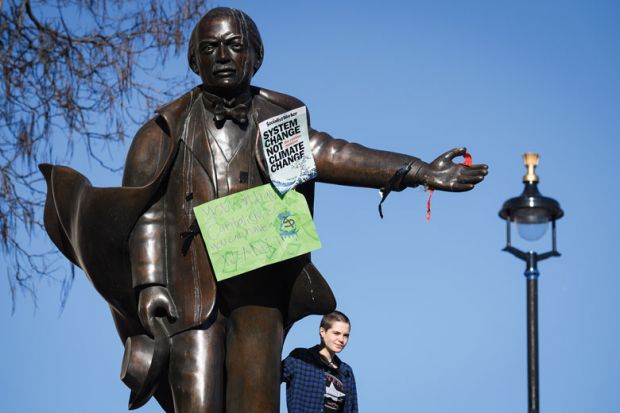Picking a fight with England’s “woke students” has become an increasingly popular ploy with Conservative ministers as a “deflection strategy” from uncomfortable headlines, a professor claims.
Writing in a Higher Education Policy Institute pamphlet published on 5 August, Andy Westwood says the Westminster government’s claims to have put the student voice “at the heart of the system” applies “only when they’re thinking what we [ministers] are thinking”.
Much of the time, in fact, ministers characterise students “as political opponents rather than as co-creators of policy”, especially since the Tories increasingly draw their electoral support from the non-graduate population, says Professor Westwood, professor of government practice at the University of Manchester.
Pressure on issues such as plans for school exams during Covid and slow-moving proposals to help pupils catch up on learning lost to pandemic-driven disruption meant that “a headline on ‘woke students’ or university regulations quickly becomes a ‘red meat’ avoidance or deflection strategy”, he writes.
“You can see this every time Department for Education ministers answer questions in Parliament,” says Professor Westwood, who was a special adviser to Labour’s John Denham in his time as secretary of state for universities.
“With continuing chaos in education, last-minute or late decisions on schools, colleges and universities and crisis after crisis on funding, health and exams, this has always been a welcome distraction. Criticising universities, their expansion and campus culture allow respite from the pressures of day-to-day policymaking during Covid-19.”
Professor Westwood goes on to say that government responses to student concerns about issues such as financial support during the pandemic have been “weak”, and that ministers have instead pursued other agendas “such as the limiting of student numbers, reducing public funding or introducing free speech legislation”.
“Throughout, the government and its agencies seem to have been much more interested in the voices that agree with and reinforce any of these agendas than those requiring immediate and practical help during the pandemic,” he writes.
More broadly, the idea of the “student voice” – embodied in the idea of students as consumers protected by a market regulator, the Office for Students, tasked with driving up competition and “value for money” – perhaps wrongly assumes that the typical undergraduate is “a rational economic actor making decisions and consuming higher education much like products and services”.
“Even if we put prejudice, ‘culture wars’ and ‘levelling up’ to one side, we still have government ministers that believe student satisfaction is too high, too many students are making the wrong decisions and that too many are doing full-time degrees in the wrong subjects and at the wrong institutions…” Professor Westwood writes.
“A system that incentivises the recruitment of more full-time residential students moving around the country through the year and then demands that they are taught online to the same levels of quality and value for money has been far from ideal.
“Students in the system have been telling them this but the government, with its suspicions, political agenda and lack of any policy alternatives, does not want to change. And does not really want to listen.”
Register to continue
Why register?
- Registration is free and only takes a moment
- Once registered, you can read 3 articles a month
- Sign up for our newsletter
Subscribe
Or subscribe for unlimited access to:
- Unlimited access to news, views, insights & reviews
- Digital editions
- Digital access to THE’s university and college rankings analysis
Already registered or a current subscriber?










